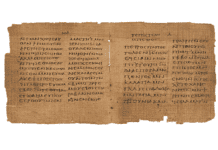Chan: I grew up in Richmond, Virginia, and the Christian spaces I went to were almost exclusively white. I would say the feeling of being a perpetual foreigner, always being sort of exoticized, really pushed me toward that trap of the model minority because it was a way of gaining conditional acceptance. Maybe people will overlook my “foreignness” if I am useful, smart, work hard. That deeply affected me spiritually, emotionally. The escape hatch for perpetual foreigner is a model minority. But model minority is also a trap.
De Leon: People have assumed that because I’m Asian American I have proximity to whiteness. During the unprecedented violence toward Asian Americans, I experienced how institutions sweep it under the rug by assuming Asian Americans are functionally white. Asian Americans are constantly having to wrestle with how we uphold anti-Blackness, while showing that the conflation of Asian Americans with whiteness is false. That tight spot is the place where a lot of Asian Americans live in. It can be stressful, lonely and painful. But that tight spot is sort of what has shaped me as the model minority myth encroaches on people’s perception of me.
What is it like to navigate honoring cultural rituals and practices while authentically living out your Christian faith?
Thao: One example I shared in the book was of attending a party for a friend’s graduation. Her family is religious and they did a few rituals, including one where we tied strings around her wrist to represent blessing and protection. I had to discern, am I doing something that seems like I’m worshipping another God? In the end, I felt a conviction to participate. It was my way of communicating that I truly cared about her no matter what her faith was.
I grew up in a system where there were rules about what you could and couldn’t do when it came to other religions. But that experience taught me it can be OK to do these things if we do it with humility and with the hope of honoring God.
RELATED: Asian American Christians see more work for the church to do to stop AAPI hate

De Leon: I’ve worked closely with our Indigenous colleagues who have modeled what culture and meaning making in rituals can look like. Christianity has served the purposes of cultural destruction, cultural genocide and colonialism. And so getting to watch some of our Indigenous siblings reclaim their cultural practices and make meaning with them given their current Christian faith commitments or religious convictions has been a helpful model.
What’s one thing you hope readers take away from the book?
Thao: For our Asian American readers, I hope they feel seen from reading the book, especially if they’re coming from Christian backgrounds. Some of the topics we bring up aren’t topics talked about a lot in immigrant or Asian American churches, at least in my experience. So I hope that as they read it, they can resonate.
De Leon: I hope Asian American Christians in particular take away that they are not without a story. There’s an experience and an identity with which they’re navigating the world. And their story is deeply woven into that of Asian America, and these stories are what allow them to interact across lines of difference to build communities of solidarity and belonging.
Chan: I hope folks who maybe have grown up in Christian spaces that are more colorblind would be able to see that God sees and cares about all of who a person is. Faith is not about colorblind doctrine, it’s about our stories, our engagement with God, our families’ stories. These things all affect how we think about identity, relationships and vocation. Hopefully the book can be a connection point and perhaps even a lifeline for the faith of those coming from colorblind spaces.
RELATED: At nationwide rallies, Christians stand up for Asian Americans
This article originally appeared on ReligionNews.com.












